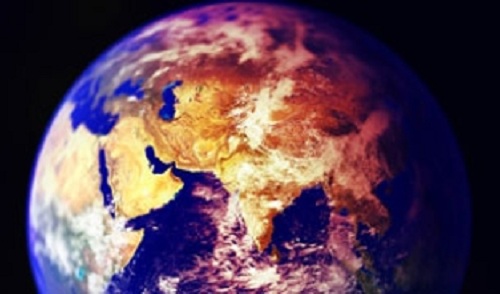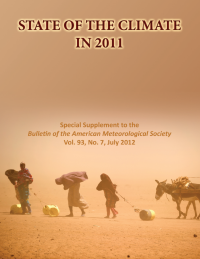Extreme heat becoming more likely under climate change
Posted on 16 July 2012 by John Hartz
This is a reprint of a news release posted by the UK's Met Office on July 10, 2012
![]()
Groundbreaking research has shown how climate change significantly increased the odds of some recent extreme weather events.

This latest science is featured in a companion piece to The State of the Climate in 2011 report, which is led by the National Oceanographic and Atmospheric Administration (NOAA) in the US and is published as part of the Bulletin of the American Meteorological Society (BAMS).

The new report, Explaining Extreme Events of 2011 from a Climate Perspective, includes contributions from the Met Office and many other research institutions from around the world. For the first time it includes so-called 'climate attribution studies', looking at six key weather events shortly after they have happened.
Dr Peter Stott, Head of Climate Monitoring and Attribution at the Met Office and one of the editors of the report, said: "The research here pushes the boundaries of attribution science in quantifying, so soon after the weather events in question, how climate change has altered the odds of their occurrence.
"While we didn't find evidence that climate change has affected the odds of all the extreme weather events we looked at, we did see that some events were significantly more likely. Overall we're seeing that human influence is having a marked impact on some types of extreme weather."
Extreme heat more likely, while the odds on unusually cold periods lengthen
Key findings from the attributions supplement include:
- December 2010 was the second coldest and November 2011 the second warmest in the Central England temperature record dating back to 1659. The extreme warm average temperature in November 2011 is 60 times more likely to have occurred than in the 1960s. The change in odds of the extremely cold December was considerably less, however, being only about half as likely. Even without climate change, unusual circulation patterns can still bring very cold winter months.
- In 2011, Texas had its hottest and driest summer in records dating back to 1895. While the heat wave was associated with La Nina conditions in the Pacific Ocean, the heat wave was 20 times more likely in such conditions than it would have been only 50 years ago.
- There were some remarkable temperatures across Western Europe in 2011. Comparisons to the temperatures previously associated with the weather patterns seen in 2011 reveal the year was almost 1.5 deg C warmer than can be attributed to weather patterns alone.
'Interconnectivity' of climate system revealed in unprecedented detail
The BAMS State of the Climate in 2011 Report also looks at a large range of key climate indicators to assess year-to-year changes.
Dr Kate Willett, a Met Office Climate Monitoring and Attribution scientist and lead editor of the Global Climate chapter of the State of the Climate report, said: "We are in the golden age of satellite technology - we can see our planet changing in more detail than ever before.
"As a result, we see evidence far beyond changing temperatures and have observed intricate links in our climate system - these changes can differ radically from region to region, and impact our daily lives in many different ways."
Examples highlighted by the report include how heavy rainfall in Australia during 2011 exacerbated wildfires - we often associate excessive fires with unusually hot and dry periods. In fact, this rainfall boosted vegetation growth, creating a large fuel bed in the dry season which led to widespread and damaging fires.
Polar stratospheric temperatures were particularly cool through 2011, allowing clouds to build up more than normal. These high cold clouds cause chemical depletion of ozone by substances (e.g. CFC's), contributing to record low levels of ozone over the north and south poles. However, there is no evidence to suggest these record low levels will persist as they have recovered in the past.
Additional Met Office Resource
Climate Monitoring and Attribution
NOTE: On the same day that the Met Office posted the above news release, the US National Oceanic and Atmospheric Administration (NOAA) posted the article, Back-to-back La Niñas cooled globe and influenced extreme weather in 2011 which summarizes The State of the Climate in 2011 report in more detail than the above.































 Arguments
Arguments























 0
0  0
0






Comments